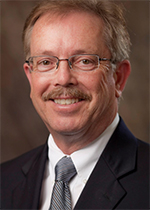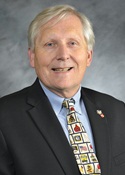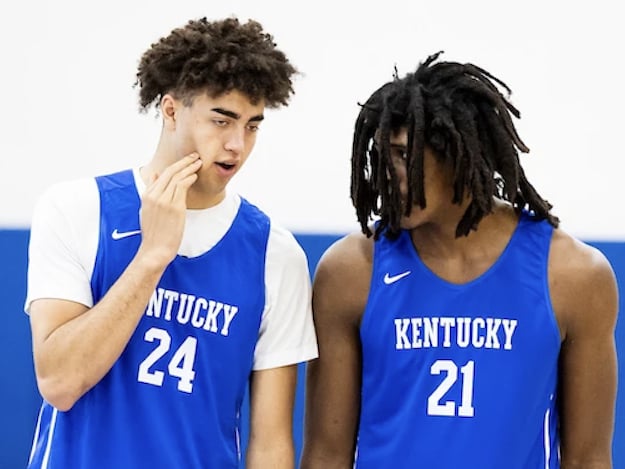[easy-social-share buttons=”facebook,twitter,pinterest,linkedin,stumbleupon,mail” counters=0 facebook_text=”Facebook” twitter_text=”Twitter” pinterest_text=”Pinterest” linkedin_text=”LinkedIn” stumbleupon_text=”Stumble mail_text=”E-mail”]
Gateway 2: A case of ‘he-said vs. he-said’ puts president and board chair at odds on issues that don’t get resolved
By Greg Paeth
NKyTribune Senior Reporter
About seven months after Jeff Groob was appointed to the board that oversees Gateway Community and Technical College, he became convinced that the college president and CEO would never provide him with information he needed to make well-informed decisions on the board.
It was May 2010 when Groob turned to the state’s Open Records Act, which requires public agencies and institutions like the college to provide information members of the public have requested. Groob’s letter to the college asked six specific questions and included a request for a detailed copy of the Gateway budget, a document that state statute requires the Gateway board, including Groob, to review.

Groob said he never got a copy of the detailed budget and never got all of his questions answered. It’s also clear that he never established much of a warm-fuzzy relationship with Dr. G. Edward Hughes, Gateway president and CEO, who has been at the college helm since it was created in 2002.
“It was more like a narrative rather than a budget,” Groob said of the material he received when he asked to see the budget. “I hate it when someone summarizes things for me. . .Decisions are being made at the local level and the board should know what the numbers are.”
On June 12, under pressure a day before the Gateway budget was scheduled for review by the state board that oversees the community college system, the local board suspended its budget review rules and approved the 2014-15 spending plan by a unanimous vote. The Gateway budget calls for expenditures of $35.9 million, which includes $15.3 million in what the college calls “restricted” funds that are received through grants and contracts with the state and federal governments.
Today Groob chairs the board, which includes five members who were appointed by Gov. Steve Beshear last year. Groob insists he has no plans to back down on his requests for information despite his emergence as a lightning rod for harsh criticism from Hughes’ supporters and others who believe Gateway’s problems shouldn’t be debated publicly.
“I believe we’re pretty transparent”
“It’s a taxpayer-funded public institution, and I think board members should have access to information that they are interested in reviewing,” Groob said.
“I take it very seriously that we’re supposed to provide oversight and not just a blessing for Ed,” said Groob, adding that he has used the Open Records Act at least a dozen times to get information as a Gateway board member. His most recent request was in mid-September, when he asked for detailed information about Hughes’ employment contracts dating back to 2000, when Hughes was the top executive at Hazard Community College.
Hughes disagreed. “I’m not aware of a situation where we didn’t give any member of the board information once they asked for it,” said Hughes, adding that much of the Gateway information is available on its website.
“I believe we’re pretty transparent,” he said.
Hughes said the board’s budget review committee has received a packet of information that’s far more detailed than anything that’s provided to the boards of the 15 other colleges in the Kentucky Community and Technical College System. “My role is to provide them information so they can give their advice and counsel on both an individual and collective basis.”
Background on Dr. G. Edward Hughes, president and CEO of Gateway Community and Technical College, from the college website:

- Earned a doctorate in higher education from Southern Illinois University, a master of arts degree in psychology from Middle Tennessee State University and a bachelor of arts degree in psychology from Catawba College, Salisbury, N.C.
- Served on the board of the Institute for Community College Development at Cornell University.
- Served as dean of academic and student affairs at North Country Community College in Saranac Lake, N.Y., before moving to Kentucky.
- Became one of the youngest college presidents in America in 1985 when he assumed the presidency of Hazard Community College at age 34. Led Hazard for 16 years.
- Served as the chair of the Presidents Academy of the American Association of Community Colleges and as president of the Southern Association of Community, Junior and Technical Colleges and the Community Colleges of Appalachia.
- Became the founding president and CEO of Gateway on Dec. 1, 2001, and is the senior public college/university president in Kentucky.
- Led the transformation of Gateway into a comprehensive two-year college with emphasis on workforce development and training, transfer education and adult education.
- Led the effort to secure accreditation by the Commission on Colleges of the Southern Association of Colleges and Universities, effective January 2008.
- Chaired the former Urban Learning Center in Covington and the Life Learning Center in Covington and served as the president of the board of the Kentucky Symphony Orchestra.
- Served or continues to serve on the following boards: Regional Stewardship Council for Vision 2015, Northern Kentucky Chamber of Commerce, North Central Area Health Education Center, Northern Kentucky Council of Partners, and the Gateway Community and Technical College Foundation.
He said the flow of information is something that he and the board “…will continue to discuss.”
The Kentucky Community and Technical College System has responded to all of Groob’s requests under the Open Records Act, said Heather Baber, senior public relations manager for the system. “Individuals who request open records are not required to explain the purpose of their request or their relationships with the system or the colleges. Mr. Groob is the only individual who has self-identified as a member of a local board,” Baber said.
When she was asked about friction between other college boards and their college presidents, Baber suggested that board minutes from the other colleges should be reviewed.
Much of the criticism aimed at Groob has come from members of the Gateway Foundation board, a private, non-profit organization that raises money for Gateway projects but is separate and distinct from the 10-person board that is entrusted with overseeing the school. Groob and other board members, both past and present, have raised questions about how the foundation, with Hughes’ consent, can make long-term commitments for the school without discussing them with the Gateway board.
Earlier this month, after the Northern Kentucky Tribune began asking questions about the relationship between the Gateway board and the foundation board, Gateway board vice-chair Ken Paul was asked to also serve on the foundation board in an effort to improve communications between the two panels. He said his first foundation meeting will be in May.
But before that happened, Groob said Hughes routinely declined to keep the board informed about foundation initiatives. “Ed Hughes has refused to tell his board what the foundation board is doing,” said Groob, partner with his wife Kathy in a political consulting firm called November Strategies, and a principal in Groob Turnaround and Growth Partners.
Although other board members aren’t as strident or as outspoken as Groob, four of the other six appointed board members said they are in agreement that Hughes should be more forthcoming with the board. Board members Ken Paul, Iversy Velez, Paul Whalen and Joe Creaghead said they believe Gateway data should be made available without a struggle.
Board members Chad Day, executive secretary of the Cincinnati Building Trades, and Dr. Julie Ann Smith-Morrow, CEO of Dress for Success Cincinnati, both said – in different ways – that as new board members they want to become more familiar with board procedures before they take a stance on Groob’s requests.
“It’s impossible for me to discuss whether materials were provided in a timely way in the past,” said Smith-Morrow, who has been a member of the Newport Board of Education since 2007. “The board has to function as a unit, and I consider Jeff a friend. I like Jeff and respect him.”
Day was reluctant to say much, suggesting that he and other new board members aren’t entirely familiar with the roles they are supposed to play. “We need to determine what the board should do versus what some members think we should do,” Day said.
“This board is trying to be appropriately active and supportive,” said Creaghead, a civil engineer who is an executive with Global Shelter Systems, a defense contractor headquartered in Ft. Thomas. “Maybe some members of this board are asking deeper questions than those that had been raised in the past, which may not be a bad thing.”
“I support the requests for more information and more transparency. I don’t think anything that Jeff asks for is a problem,” said Paul, vice chairman of the board and the only board member who has served since the college was founded some 13 years ago. “Information isn’t flowing to the board at times.”

“I think the people who were appointed (last year) – and this is not to say that the other people didn’t serve well – but they (new board members) want to take a more active role,” said Paul, whose career in public service includes 17 years as a member of the Campbell County Fiscal Court, where he was judge-executive for 13 years, and 10 years in the City of Southgate, where he was the mayor for eight years.
“He’s (Hughes) not one to volunteer things. You have to ask,” said board member Paul Whalen, a Ft. Thomas attorney who served on the Kentucky Board of Education for four years and the Ft. Thomas Board of Education for more than 12 years. Whalen said he was “shocked” to learn that Groob felt that he had to use the open records law about a dozen times to get Gateway information. “You should be able to just call up and get the information you need,” Whalen said.
“We have been asking more questions, and we want to know about the long-term implications for the college,” Whalen said.
“Jeff Groob definitely has the support of the board. I think his intentions have been good, however, some of his questions may have been misunderstood,” said Iversy “Ivy” Velez, an immigration attorney who has an office in Florence. “We want the college to be successful and to thrive, and to be helpful we need to get real accurate information. Without that we can’t give good advice.”
From all indications, a constant source of friction has been the lack of communication between the two boards.
Groob, Whalen, Paul and former 12-year board member R. Richard Jordan, who chaired the board for 10 years, said they routinely learned about real estate purchases by the foundation through the media, not from anyone at Gateway. In some cases, this meant the Gateway board had to approve annual budgets that included funds to maintain and operate buildings that the board had no role in acquiring, they said.
“They’re not consulting the Gateway board, which has to approve a budget on property they had no say in (acquiring),” Jordan said.
“We have been asking more questions, and we want to know about the long-term implications for the college”
“The new board is not taking any superficial answers. They want to go deeper,” Jordan said. “The key thing is a lot of questions are being asked and they’re getting pushback from Gateway.”
Hughes disagreed, saying that the board has discussed Gateway’s master plan, which includes plans for the development of the campus, in public board meetings and has been informed about property acquisitions in executive sessions.
For example, funds to pay the $175,000-a-year lease on the former Marx building in downtown Covington, as well as maintenance and operating costs, were budgeted, Hughes said.
Lee Flischel, who chaired the foundation board since it was created about 12 years ago but stepped down earlier this year, and other members of that board made it clear that their allegiance is to Hughes.
“We just passed a resolution at the last foundation board meeting. It’s a resolution that was unanimous in its support of what Dr. Hughes is doing and it was forwarded to Dr. (Michael) McCall,” Flischel said. The resolution was passed when McCall was still president of the Kentucky College and Technical School System. He retired Jan. 15.
“Clearly Mr. Groob’s actions call into serious question his motives for being on the board and serving as the chair of an advisory board that is supposed to be about helping the college,” Flischel said in an “Op Ed” column that was written for the River City News last fall. “It is clear that he has a personal agenda and one that is not good for the college or the community.”

In an interview for this story, Flischel said he would reveal the “real truth” about the Groob-Hughes relationship and Groob’s personal agenda if the information was never written about. Because he established those conditions, the reporter for this story decided against hearing his theory, based on NKyTribune policies.
“What has Jeff Groob ever accomplished to make him think anyone would care what he thinks?” said Covington City Commissioner Steve Frank, who is also a member of the Gateway Foundation board and a strong supporter of the Urban Campus in downtown Covington.
“Personally, I am tired of Jeff Groob’s personal vendetta against Ed Hughes. As a member of the Gateway Foundation board, I am working to promote Gateway, and all Jeff Groob does is create discord and try to tear it down,” attorney James E. Parsons said in a comment he posted on the River City News website after a contentious Gateway board meeting last fall. Parsons is an attorney with the highly regarded law firm of Taft, Stettinius & Hollister in Cincinnati. He also served as Newport city solicitor and city manager and Boone County administrator and deputy judge-executive.
Parsons, who now chairs the foundation board, declined to comment further about the “personal vendetta” against Hughes. “I don’t want to make any comments at this time. It doesn’t help anything,” Parsons said. “I think enough has been said in the paper.”
Asked if he thought Groob had a vendetta against him, Hughes paused for perhaps 10 or 15 seconds before he responded. “I don’t really know, and I believe people have good intentions and want this college to do well,” he said.
The Gateway board bylaws mirror the state statute that spells out five specific responsibilities for the local board:
- 1. Recommend a candidate for the community college president and CEO from three candidates provided by the president of the Kentucky Community and Technical College System. The (state) president shall have the authority to make the final appointment and shall not be bound by the recommendation from the (local) board of directors.
- 2. Evaluate the community college president and CEO, and advise the Kentucky Community and Technical College System president of the college president’s performance. The president of the Kentucky Community and Technical College System has final authority for the appointment and termination of the community college president.
- 3. Approve budget requests for the college district for recommendation to the Kentucky Community and Technical College System.
- 4. Adopt and amend an annual operating budget and submit it through the college president and CEO and appropriate channels to the Board of Regents of the Kentucky Community and Technical College System for approval.
- 5. Approve and implement a strategic plan that is developed in coordination with local employers, civic leaders, campus constituents, and other post-secondary institutions in the region and that is consistent with the strategic agenda of the General Assembly.
One point of contention is the question of how much authority the Gateway board has. Groob’s critics as well as a spokesperson for the state college system and some board members said the board’s role is merely advisory, making recommendations to the 14-member board of regents that runs the state system. Robert G. Cooper of Newport, the Northern Kentucky representative on the state board, could not be reached for comment.
An attempt to get a comment about the roles local boards should play from Dr. Jay Box, the new president of the state system, was unsuccessful. Baber said state statute spells out the responsibilities of the local boards.
Groob concedes that the state board in Versailles has the final authority on Gateway and the 15 other colleges in the system. But he said he doesn’t believe that means the local board should be no more than a rubber stamp for whatever Hughes and his staff present.
“I’ll give $1,000 to anyone who can find the word ‘advisory’ in the statute that we operate under,” Groob said.
Whalen said he believes the Kentucky legislature needs to re-examine the relationship between the state board of regents and the boards that oversee the individual colleges. He said he believes there’s very little communication between the two boards and that the state board may not “drill down” on issues at the local level, including the budget. “I’d like to see more interaction between the boards,” he said.
Because the current Gateway board was not sworn in until mid-2014, the board’s evaluation committee decided last Nov. 5 not to evaluate Hughes last year. The committee requested information from the state board of regents about whether there is a “standard president evaluation form” available.
Several of the board members and Hughes said they were optimistic that some of the disagreements might be resolved at a board retreat that was held after they were interviewed for this story. Hughes said a professional facilitator from the Association of Community College Trustees was being brought in to chair the two-day meeting.
The day before the retreat, Hughes sounded optimistic.
“You know, it’s 2015. It’s a new year. We have six new members of the board. We’re developing a really good, positive relationship between the board individually and the board collectively – 10 members and myself,” Hughes said. (Five of the governor’s seven appointees were new members. One of the three Gateway representatives was new last year.)
“This is a very talented board – the seven appointees by the governor and the (three) Gateway representatives are very talented and they bring really unique talents and individual talents, and each and every last one of them is deeply committed to the college.
“I think the future of this board – and I hope they agree with me – our goal together is to be the most respected board of directors in the KCTCS (the state system) if not a model for the country, and I think we’re moving in that direction. I love the board. I love every member of the board. I’m going to move on.”
Whalen said he thought the retreat was successful and that many of the issues that had faced the board have been resolved.
Immediately after the retreat, Gateway sent out a brief press release about the retreat that included a photo of Groob and Hughes sitting side-by-side and smiling.
The release was presented as an unattributed summary of the retreat and said, in part: “They (board members) praised the work of the faculty and staff and voiced appreciation for the leadership team who made presentations during the retreat.”
The press release concluded with a statement that was attributed to Groob: “The board and the president are on the same page and are working together. We have a collective focus on removing barriers to enrollment and student success at Gateway. We will reach out to community partners who can provide help for our students. On behalf of the board I want everyone to know that we are committed to do our part to advocate for and advance the institution to the next level.”
Next: Manufacturers need trained employees at a pace beyond Gateway’s success in providing them
Editor: Mike Farrell, special projects editor
[easy-social-share buttons=”facebook,twitter,pinterest,linkedin,stumbleupon,mail” counters=0 facebook_text=”Facebook” twitter_text=”Twitter” pinterest_text=”Pinterest” linkedin_text=”LinkedIn” stumbleupon_text=”Stumble mail_text=”E-mail”]

















